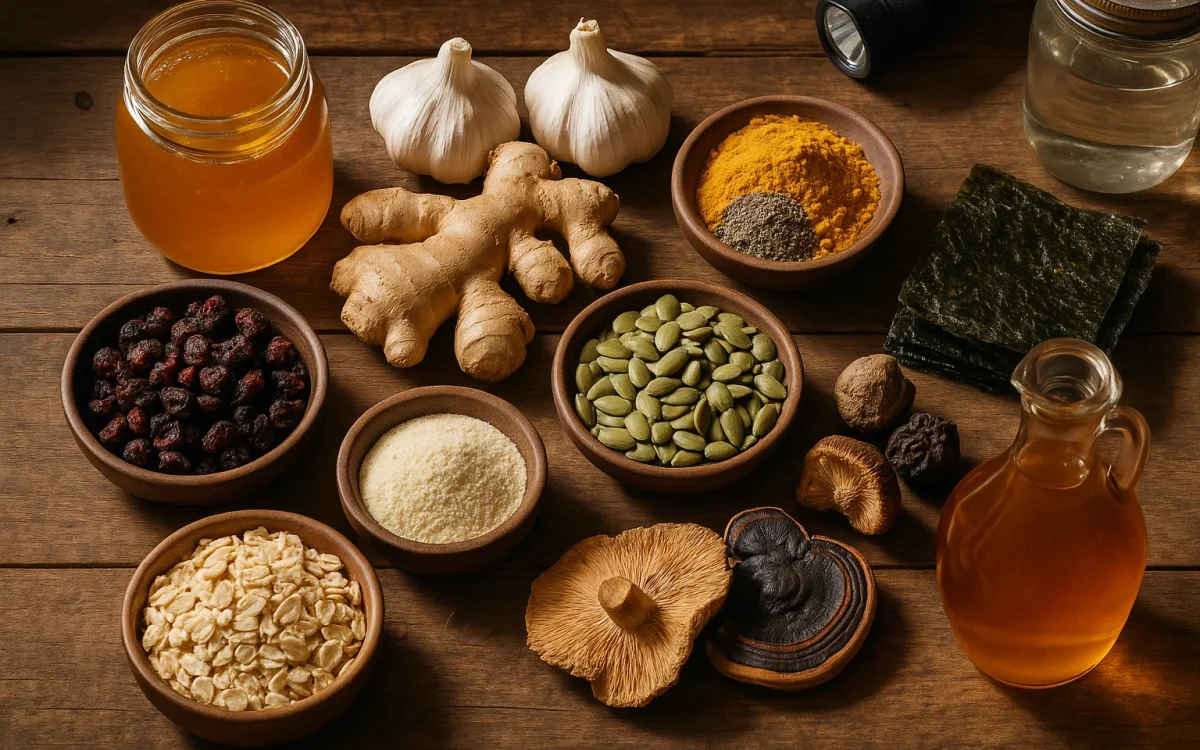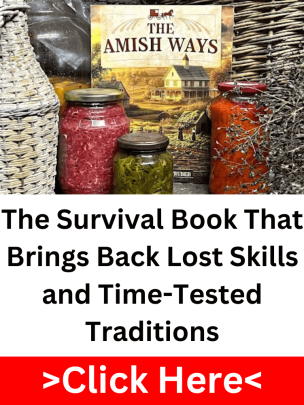When the grid goes down, immunity becomes a survival priority, fast. Without power, everything that normally protects you starts to break down. Sanitation drops, water quality becomes questionable, stress shoots up, sleep gets worse, and food variety shrinks. All of this weakens your defenses, making even small infections far more dangerous.
That’s why strong immunity isn’t a “health trend” in a collapse. It’s part of staying alive. And the smartest preppers know you can’t build that overnight, you build it with the foods you store long before anything goes wrong.
In this guide, you’ll find 12 natural superfoods that are cheap, long-lasting, and proven to help your body stay resilient when conditions get rough. No hype. No miracle claims. Just practical, shelf-stable foods you can actually depend on.
The Best Immunity Superfoods for Survival
Honey
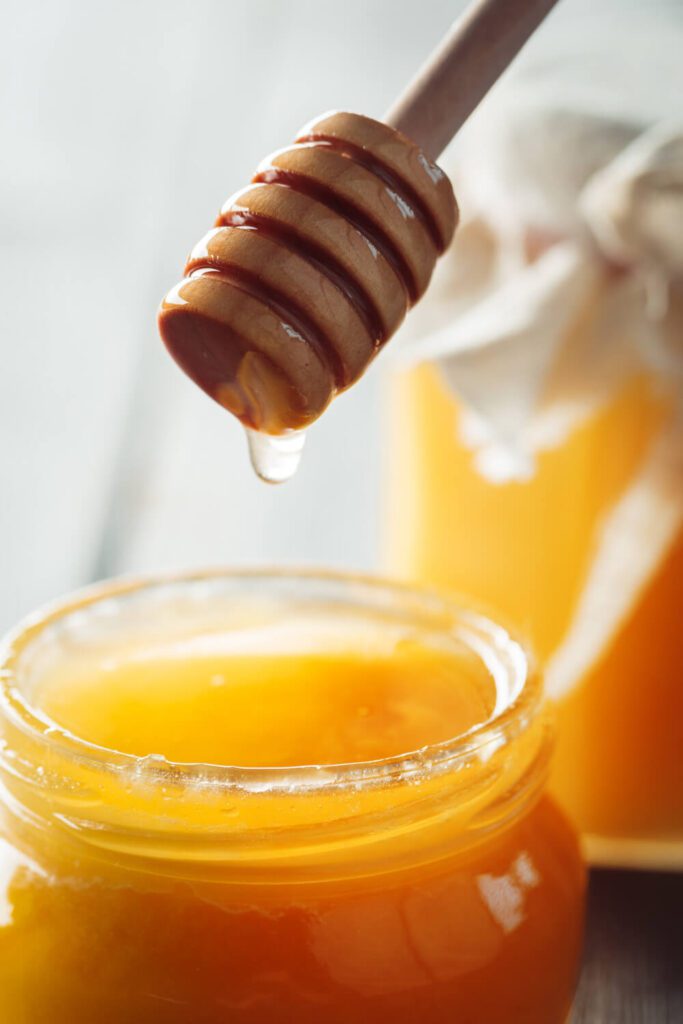
Honey is one of the most useful survival foods you can store. Raw, unfiltered honey naturally fights bacteria, helps soothe sore throats, and gives you quick, reliable energy when calories matter most. Because of its low moisture and high acidity, it can last practically forever without refrigeration.
In a grid-down situation, honey earns its place fast: use it to calm coughs, treat small wounds, boost energy, or mix into warm drinks when you’re run down. It’s simple, versatile, and one of the easiest immune-supporting foods to stock.
If you’re into natural remedies, this pairs really well with the herbal mixes found in Forgotten Home Apothecary.
Garlic
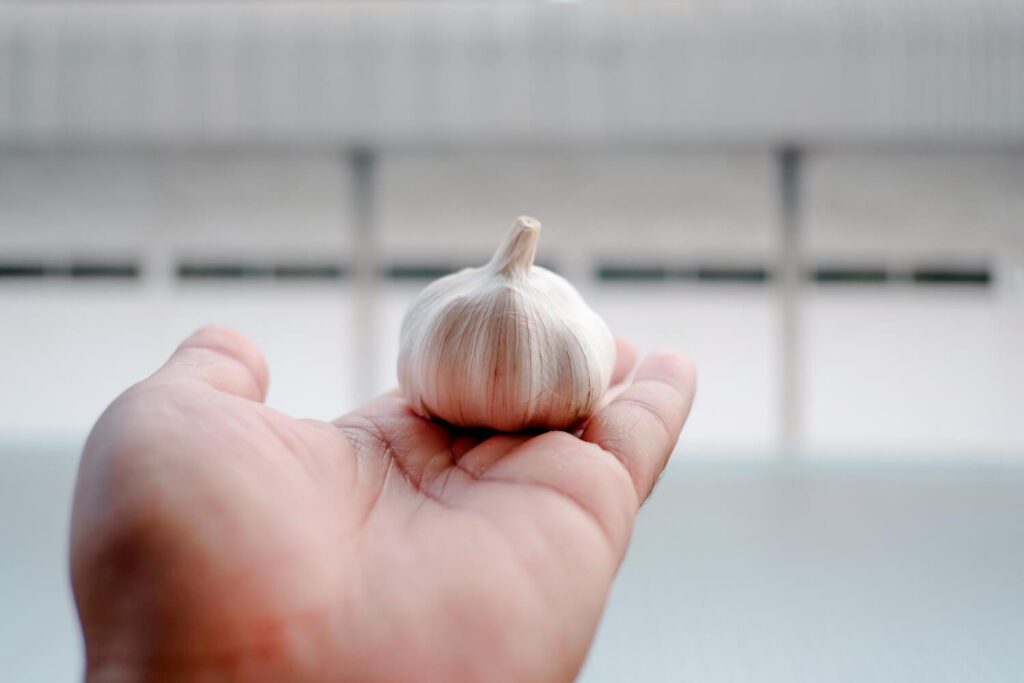
Garlic has been a go-to immune booster for centuries, and it earns that reputation. Its natural compounds help your body fight off viruses and bacteria, making it one of the simplest ways to support your immune system when medical care isn’t easy to find.
It’s especially useful for respiratory issues, colds, coughs, congestion, exactly the problems that spread fast when the grid is down.
Fresh garlic lasts weeks to months, but dehydrated or powdered garlic is where it really shines for preppers. It stores for years, takes up almost no space, and works in any meal. A small jar can pull a lot of weight in both flavor and immune support.
Ginger
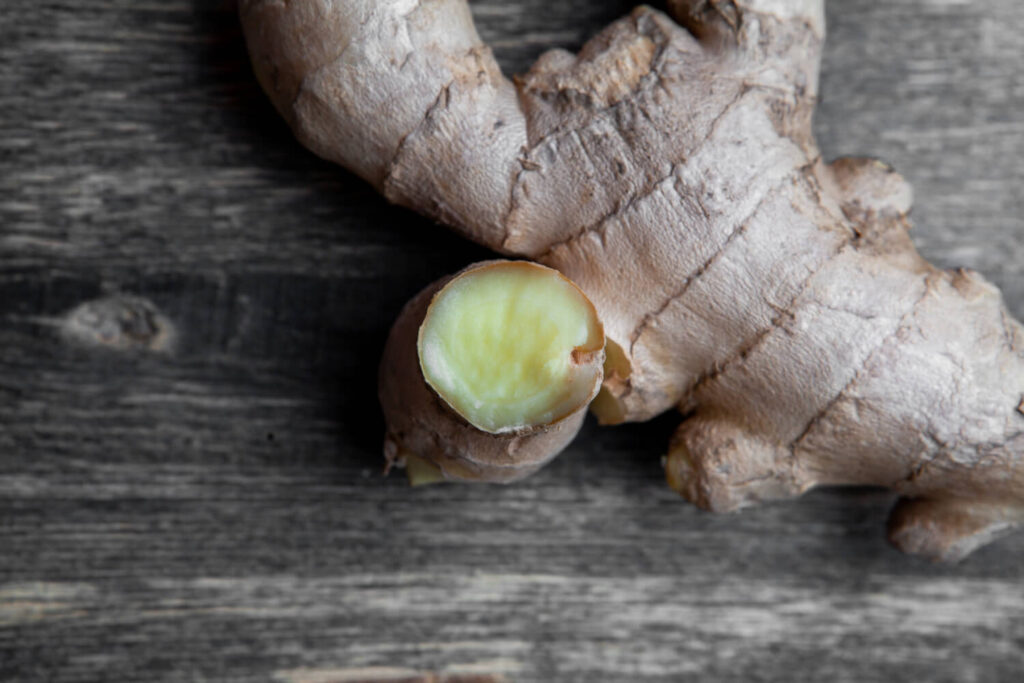
Ginger is one of those quiet workhorses that pays off fast in a survival pantry. It supports your immune system, keeps digestion steady, and helps calm nausea, something that can hit hard when stress and limited food choices kick in.
It really shines in tea. A little fresh or dried ginger in hot water can warm you up, clear your head, and ease an upset stomach. That matters in a grid-down situation, where stress alone can throw your whole system off.
Fresh ginger doesn’t last forever, but dried ginger root or powder stores extremely well and stays potent for a long time. It’s lightweight, easy to pack, and takes almost no effort to use, perfect for collapse conditions.
Turmeric + Black Pepper
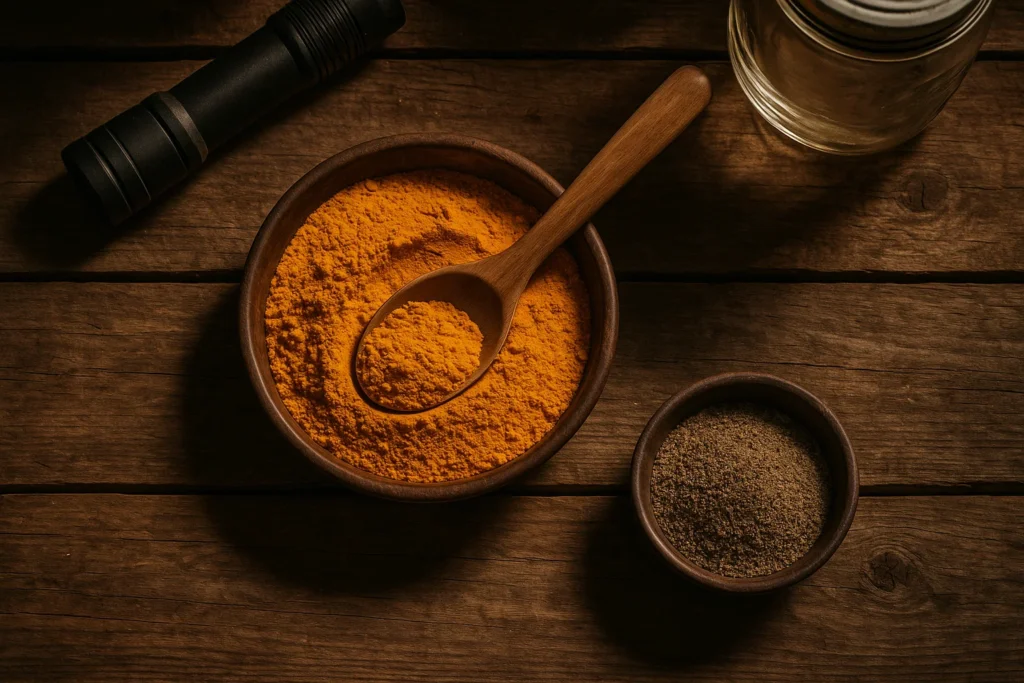
Turmeric is one of the best natural anti-inflammatories you can keep on hand, and it becomes even more effective when paired with black pepper. Pepper boosts the absorption of curcumin, the active compound in turmeric, by a huge margin, which means your body actually gets the benefits instead of wasting them.
In a grid-down situation, inflammation hits harder than you think. Stress, cold, hard work, and limited nutrition all put extra pressure on your joints and immune system. A simple turmeric-and-pepper mix can help your body stay steadier under that load.
The best part? Turmeric powder stores for years with almost zero effort. It’s lightweight, cheap, and one jar will last through a long emergency.
Canned or Dried Berries
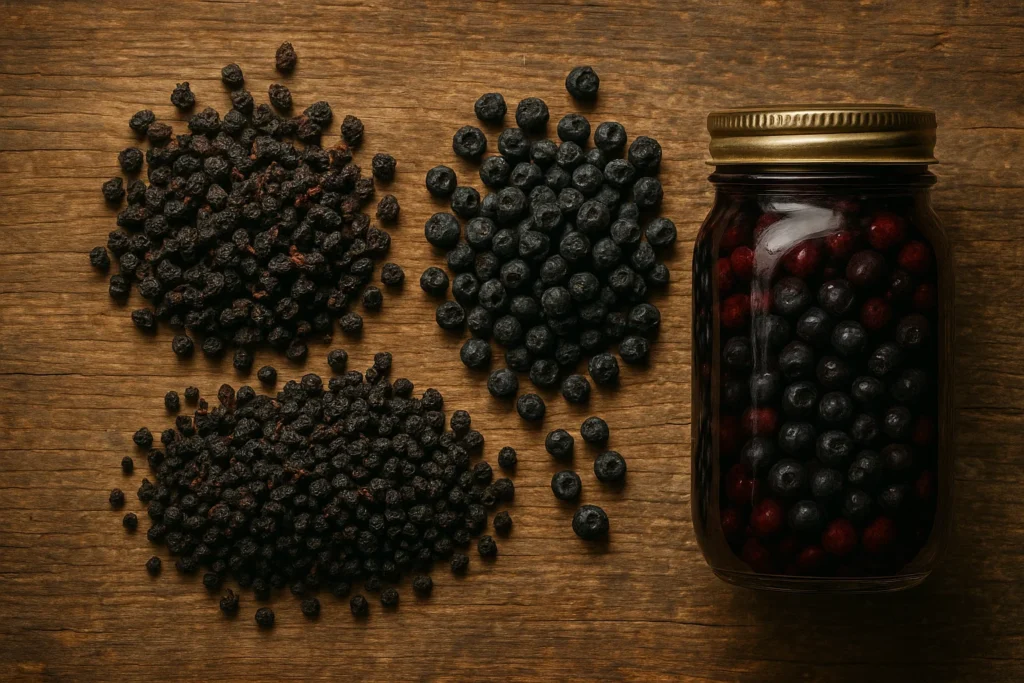
Berries are some of the strongest natural antioxidants you can put in your survival stash. Blueberries help fight oxidative stress and support overall immune function, while elderberries have a long history of being used during cold and flu season for their antiviral properties.
The real advantage for preppers is shelf life. Canned berries last for years, and dried berries last even longer without taking up much space. You can toss them into oatmeal, mix them into trail snacks, or steep them into a quick immune-supporting tea.
Simple, lightweight, and dependable, exactly what you need when fresh fruit isn’t an option.
Fermented Foods
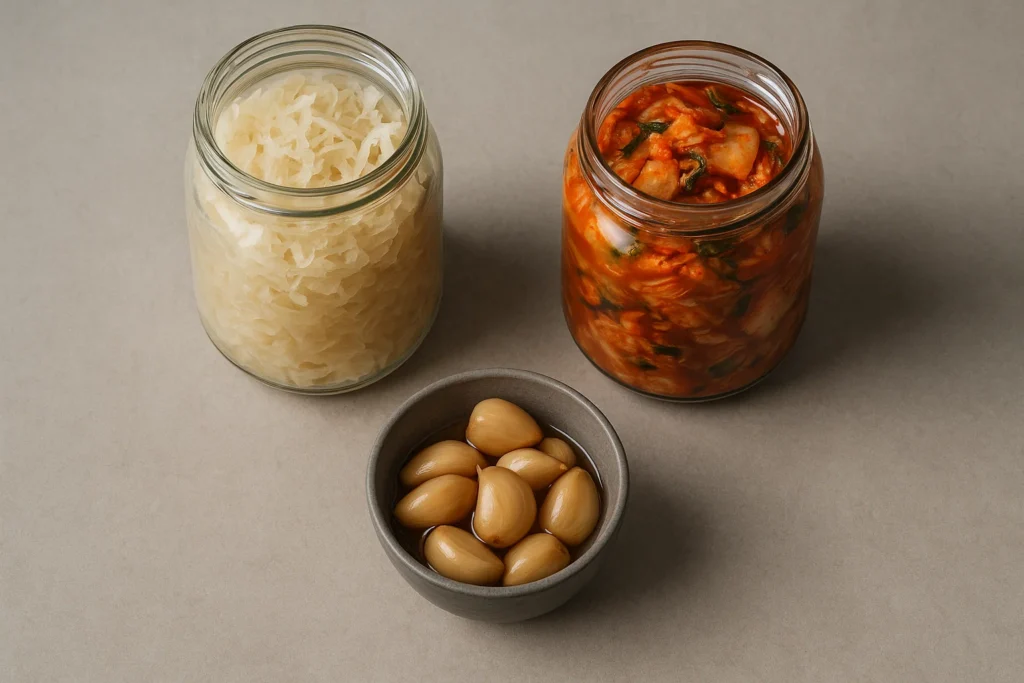
Fermented foods are one of the most underrated immunity boosters you can store. They feed the good bacteria in your gut, and since a big part of the immune system lives there, keeping your gut healthy keeps the rest of you stronger.
They’re also perfect for preppers because good fermentation naturally preserves food. A jar of sauerkraut or kimchi can last months in cool storage, and it still delivers vitamins, probiotics, and minerals when fresh produce is long gone.
They’re cheap, easy to make at home, and give you immunity support without relying on refrigeration or modern medicine, exactly what you want in a grid-down lifestyle.
Bone Broth Powder
Bone broth powder is one of the easiest ways to get immune and gut support without hauling heavy cans or jars. It’s packed with amino acids that help keep your gut lining strong, a big deal when stress, poor sleep, and limited food options start wearing your system down.
It also gives you lightweight, quick protein. When you’re sick, run-down, or not eating enough, a warm cup of broth can make a real difference. No cooking, no equipment, just hot water and a scoop.
Because it’s shelf-stable and compact, it fits perfectly into any survival pantry or bug-in setup.
Oats
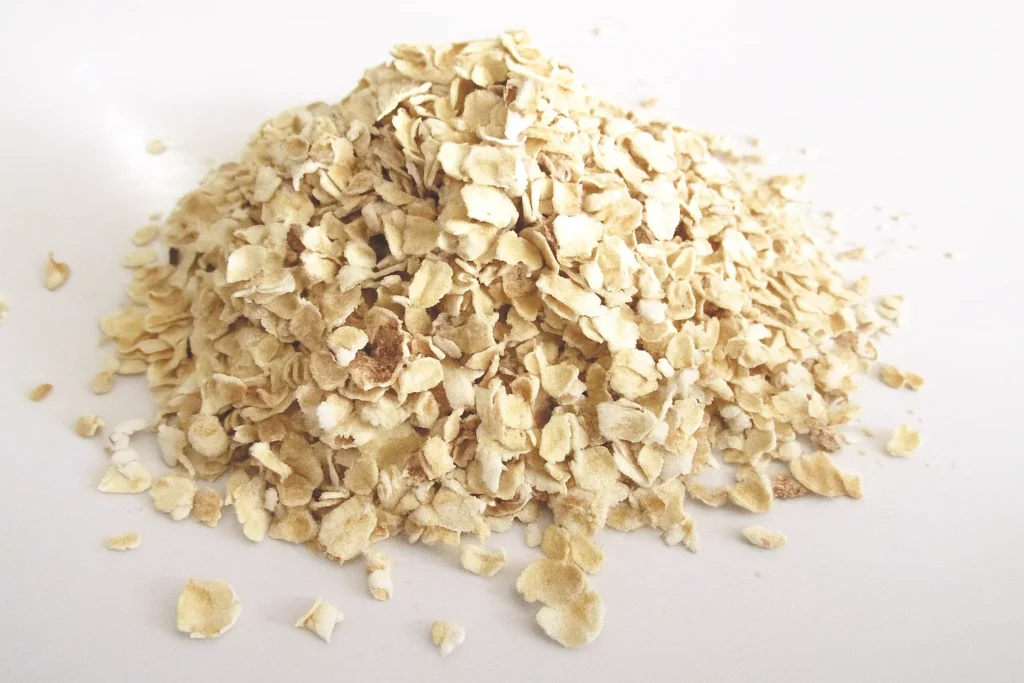
Oats are one of the most reliable survival staples you can store. They’re packed with beta-glucans, a type of fiber that helps activate the immune system and keep it responsive when your body is under pressure.
They also deliver steady energy, which matters when meals get smaller and your days get harder. And with proper storage, Mylar bags and oxygen absorbers, oats can last well over 20 years without losing much quality.
Cheap, filling, long-lasting, and immune-supporting… oats check every box a prepper could ask for.
Seaweed (Nori, Wakame, Kelp)
Seaweed is one of the most mineral-dense foods you can store, and it’s especially valuable for its iodine content. Iodine keeps your thyroid working properly, and a healthy thyroid plays a big role in keeping your immune system steady, something most people don’t think about in a survival situation.
It’s lightweight, lasts forever when stored dry, and gives you nutrients that are almost impossible to get from typical pantry foods like rice, beans, and canned meat.
Just one note of caution: a little goes a long way. Too much iodine isn’t good either, so use seaweed as an occasional boost, not an everyday staple.
Medicinal Mushrooms (Chaga, Reishi, Shiitake)
Medicinal mushrooms are some of the strongest natural immunomodulators you can store. Instead of just “boosting” immunity, they help balance it, making your body respond better to stress, infection, and fatigue. Chaga, reishi, and shiitake are the big three most preppers rely on.
Dried mushrooms have an excellent shelf life, barely take up any space, and stay potent for a long time. That makes them a smart addition to any survival pantry.
They’re especially good in teas. A simple mushroom tea can support your immune system, warm you up, and give your body a steady supply of antioxidants when you’re worn down.
Pumpkin Seeds
Pumpkin seeds are one of the easiest ways to get zinc, a mineral your immune system absolutely depends on. Zinc plays a major role in how your body fights infections, and most survival diets don’t provide nearly enough of it.
These seeds store well for long periods when kept dry and sealed, making them perfect for a grid-down pantry. They’re simple to use, too, add them to oatmeal, mix them into trail blends, or grind them into a powder for extra nutrition in soups or bread.
Small, shelf-stable, and loaded with immune-supporting minerals, pumpkin seeds earn their spot in any prepper’s stash.
Apple Cider Vinegar
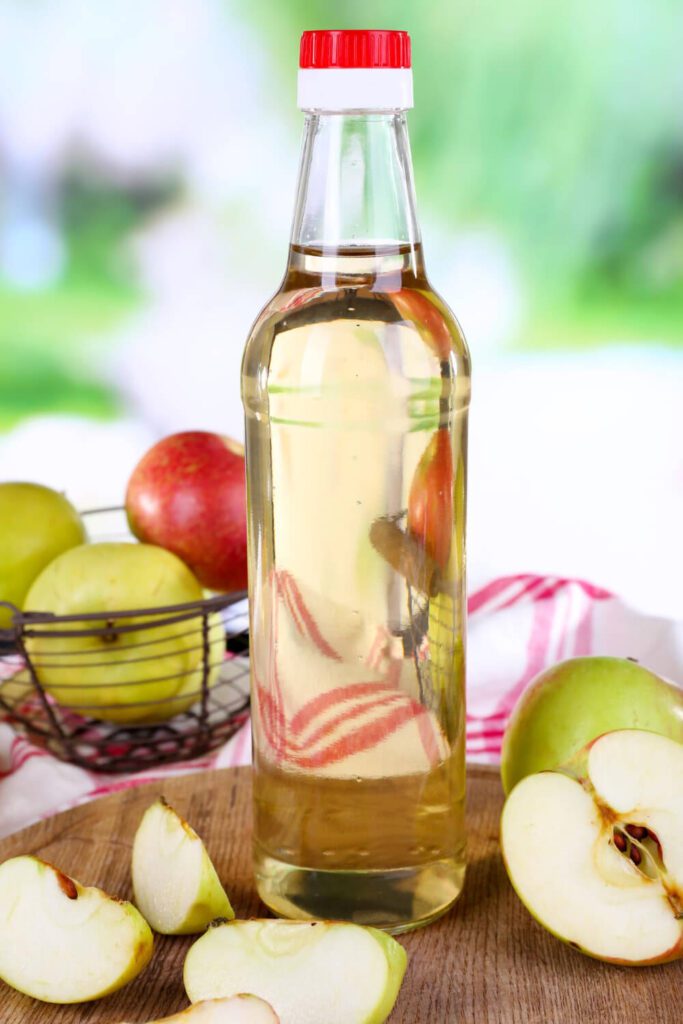
Apple cider vinegar earns its place in a survival pantry for two big reasons: it’s naturally antimicrobial, and it lasts almost forever. A splash of ACV can help clean produce, support basic food preservation, and add acidity where you need it when refrigeration isn’t an option.
It’s also popular for digestion and general immune support. When stress and limited food choices hit your system hard, a little ACV mixed with water can help settle your stomach and keep things moving smoothly.
Just use it diluted, ACV is strong stuff, and a small amount goes a long way.
How to Store These Superfoods for Long-Term Survival
Storing immunity foods the right way is just as important as choosing them. Each of these superfoods holds up well long-term, but they last even longer when you protect them from the three things that destroy food fast: moisture, oxygen, and light.
Here’s the simple breakdown:
- Dry goods like oats, pumpkin seeds, turmeric, dried berries, and powdered garlic
Store them in Mylar bags with oxygen absorbers. Keep them in a dark, cool place. Expect 10–25+ years depending on the food.
- Honey
Keep it in a sealed glass jar. It basically lasts forever. If it crystallizes, warm it gently, don’t boil it.
- Fermented foods (sauerkraut, kimchi)
Store in glass jars. They last months in cool storage and stay safe as long as they’re submerged in brine.
- Bone broth powder, medicinal mushrooms, dried ginger
Airtight containers, away from heat and moisture. Good for 1–3 years, often longer if unopened.
- Seaweed (nori, kelp, wakame)
Keep it dry, sealed, and out of sunlight. Lasts years without losing potency.
- Apple cider vinegar
Store in a dark glass bottle with the cap tightly closed. Essentially indefinite shelf life.
A little organization and the right containers go a long way. Once these foods are sealed and stored properly, they’ll stay ready for the day you need them most.
Sample Grid-Down Daily Immunity Plan
Here’s a simple, no-fuss way to use a few of these superfoods in one day. No fancy recipes, no special equipment, just practical fuel that keeps your body steady when resources are tight.
Morning
- A cup of hot water with ginger (fresh or dried)
- Add a spoon of honey for energy and throat support
- A small handful of pumpkin seeds for zinc and healthy fats
Midday
- Oats cooked with a scoop of dried berries
- Stir in a pinch of turmeric + black pepper for anti-inflammatory support
Evening
- A warm cup of bone broth powder to settle digestion and give your body protein
- Optional: a piece of seaweed or a sprinkle of kelp flakes for minerals
Anytime
- Apple cider vinegar diluted in water (1–2 teaspoons) if digestion feels off
This isn’t a “perfect” diet, it’s a realistic, low-effort plan you can actually follow during a grid-down situation. It keeps your immune system supported, your energy stable, and your stomach calm without needing refrigeration, fresh produce, or complicated cooking.
Common Mistakes to Avoid
Even the best immunity foods won’t help much if you use them wrong. Here are the mistakes that trip up a lot of preppers:
Relying on just one food
No single item covers everything. Immunity needs variety, mix these foods so your body gets a wider range of nutrients.
Not rotating your stock
Even long-lasting foods have limits. Check dates, use what’s getting older, and replace it. A simple rotation keeps your stash fresh without wasting money.
Going overboard on seaweed
Seaweed is great for iodine, but too much can push your thyroid the wrong way. Use it occasionally, not daily.
Overusing apple cider vinegar
ACV is helpful, but strong. Always dilute it. Too much can irritate your throat or stomach over time.
Assuming foods can replace medicine
These superfoods support your body, but they don’t act as emergency treatment. If you have access to proper medical care, use it.
Keeping these points in mind makes your immunity plan far more reliable, and a lot safer, when the grid goes down.
When the grid goes down, strong immunity isn’t a luxury, it’s a layer of protection you can’t afford to skip. These superfoods give your body what it needs to stay steady when stress, limited food, and rough conditions start hitting you all at once.
You don’t have to stock everything overnight. Start small. Pick two or three items that make sense for you, honey, oats, garlic, dried berries, and build from there. A simple foundation goes a long way, and every addition strengthens your overall readiness.
If you want to go deeper into natural remedies that fit perfectly with this kind of pantry, the herbal guides in Forgotten Home Apothecary pair well with everything in this list and can expand your skill set even further.
Small steps now mean fewer problems later, and a stronger, more resilient you when it matters most.
The Video Every Prepper’s Talking About:







